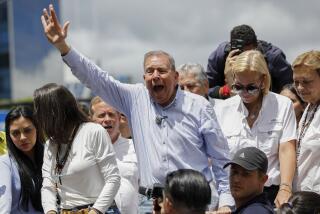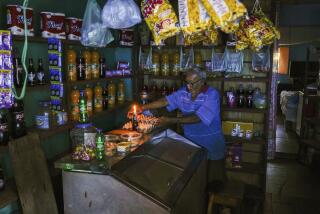Venezuela says Hugo Chavez will remain in charge
The Venezuelan government tried to strike a confident pose Friday after the revelation that President Hugo Chavez had a cancerous tumor removed in Cuba unleashed anxiety and uncertainty across the South American country.
Government officials said Chavez would be able to manage the affairs of state during his convalescence, with Vice President Elias Jaua declaring that the president was in “full condition to stay in charge as head of state, and I see no need to replace him.”
Yet key questions about Chavez’s future — and the nation’s — remained unanswered.
The usually visible and voluble Chavez appeared muted and wan in a 14-minute taped address Thursday to break the news of his disease after being out of sight for nearly three weeks.
He did not say what kind of cancer he had or its precise location, only that he was undergoing “complementary treatment” in Cuba. He not indicate whether it was chemotherapy or radiation treatment, how long it would last or when he would return to Venezuela.
Also unclear is whether Chavez will drop out of the presidential race next year, and there was some concern over the political fallout that his withdrawal would create.
“The lack of information on the president’s health shows the lack of transparency, the lack of democratic spirit of the government, “ said Ramon Guillermo Aveledo, executive secretary of a coalition of opposition parties known by the acronym MUD. “Credible information is not just a video or a photo showing the president conversing with Fidel Castro.”
But Information Minister Andres Izarra sent a tweet saying Chavez would have to turn over control of the government to the vice president only “in the case of not returning to Venezuela in the next 180 days.”
The state-run Telesur television channel broadcast a video of Chavez on Friday conferring with his brother Adan Chavez, who is governor of Barinas state, Foreign Minister Nicolas Maduro and armed forces chief Gen. Henry Rangel Silva. The video apparently was meant to show Chavez still in charge.
Telesur also interviewed several of Chavez’s poor and blue-collar staunch supporters.
“Upward and onward, Commandante!” Carlos Rodriguez shouted at the TV cameras as he was interviewed in central Caracas’ Plaza Bolivar.
“He must recover as soon as possible because the revolution needs him,” said an emotional Rosa Magallanes.
But the seriousness of Chavez’s illness, underscored by his somber demeanor and apparent weight loss, forced many Venezuelans to imagine a country without Chavez as leader.
“If you ask me today, I would surmise he won’t run” in next year’s election, political analyst Ricardo Sucre said. “Judging from what he said, his treatment will be a long process. I’m not saying he will die, but his mood seemed to communicate that his health is more complicated than what most people expected.”
Who could replace Chavez as his party’s candidate is an open question. Sucre said the possibilities include his brother Adan and his daughter Maria Gabriela. Others suggest former army comrades Diosdado Cabello or Francisco Arias Cardenas, both members of the National Assembly.
Chavez’s illness does not create an opening for opposition candidates because any effort to take advantage of the situation “could backfire,” said Cynthia Arnson of the Woodrow Wilson International Center for Scholars in Washington. “Personal calamity evokes a great deal of popular sympathy.”
In fact, a race without Chavez could complicate matters for the opposition, said Ricardo Hausmann, a professor at the Kennedy School of Government at Harvard. “What makes an anti-Chavez candidate attractive could be totally different from what the electorate wants in a post-Chavez candidate.”
Cynthia McClintock, a political science professor at George Washington University, said even a healthy Chavez faced a tough reelection battle because of deteriorating security and a poor economy. She predicted a bitter power struggle within Chavez’s party if he is not in charge.
Bruce Bagley, a political scientist at the University of Miami, sees the possibility of a military coup if Chavez withdraws or dies.
“Political instability is likely to ensue, accompanied by a high potential for political violence in Caracas and elsewhere in the country’s urban and rural areas,” he said.
Mogollon and Kraul are special correspondents.
More to Read
Sign up for Essential California
The most important California stories and recommendations in your inbox every morning.
You may occasionally receive promotional content from the Los Angeles Times.










